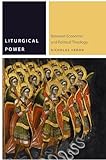Liturgical Power : Between Economic and Political Theology / Nicholas Heron.
Material type: TextSeries: CommonalitiesPublisher: New York, NY : Fordham University Press, [2017]Copyright date: ©2018Description: 1 online resource (216 p.)Content type:
TextSeries: CommonalitiesPublisher: New York, NY : Fordham University Press, [2017]Copyright date: ©2018Description: 1 online resource (216 p.)Content type: - 9780823278688
- 9780823278718
- 261.7 23
- BR115.P7 H468 2018
- online - DeGruyter
- Issued also in print.
| Item type | Current library | Call number | URL | Status | Notes | Barcode | |
|---|---|---|---|---|---|---|---|
 eBook
eBook
|
Biblioteca "Angelicum" Pont. Univ. S.Tommaso d'Aquino Nuvola online | online - DeGruyter (Browse shelf(Opens below)) | Online access | Not for loan (Accesso limitato) | Accesso per gli utenti autorizzati / Access for authorized users | (dgr)9780823278718 |
Frontmatter -- contents -- INTRODUCTION -- 1. THE ECONOMIC GOD -- 2. LITURGICAL POWER -- 3. THE PRACTICE OF HIERARCHY -- 4. INSTRUMENTAL CAUSE -- 5. ANTHROPOLOGY OF OFFICE -- CONCLUSION -- ACKNOWLEDGMENTS -- NOTES -- BIBLIOGRAPHY -- index
restricted access online access with authorization star
http://purl.org/coar/access_right/c_16ec
Is Christianity exclusively a religious phenomenon, which must separate itself from all things political, or do its concepts actually underpin secular politics? To this question, which animated the twentieth-century debate on political theology, Liturgical Power advances a third alternative. Christian anti-politics, Heron contends, entails its own distinct conception of politics. Yet this politics, he argues, assumes the form of what today we call "administration," but which the ancients termed "economics." The book's principal aim is thus genealogical: it seeks to understand our current conception of government in light of an important but rarely acknowledged transformation in the idea of politics brought about by Christianity.This transformation in the idea of politics precipitates in turn a concurrent shift in the organization of power; an organization whose determining principle, Heron contends, is liturgy-understood in the broad sense as "public service." Whereas until now only liturgy's acclamatory dimension has made the concept available for political theory, Heron positions it more broadly as a technique of governance. What Christianity has bequeathed to political thought and forms, he argues, is thus a paradoxical technology of power that is grounded uniquely in service.
Issued also in print.
Mode of access: Internet via World Wide Web.
In English.
Description based on online resource; title from PDF title page (publisher's Web site, viewed 02. Mrz 2022)


